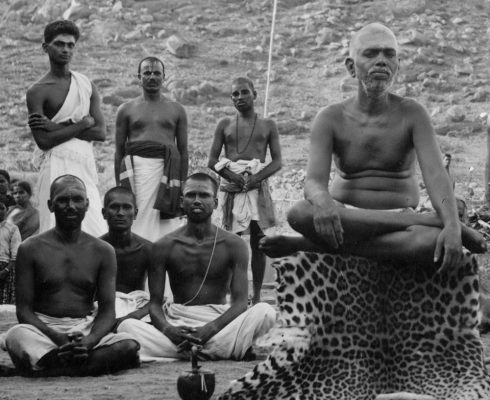
1629
You whose tresses are dark and fragrant!
The sun [of jnana], Venkata,
came as the rain of grace
to save the languishing crop
of the souls of his devotees.
In order that the darkness of ignorance
that subsists in the cavity of the Heart-bud
may be destroyed, let us with him
play kannokkam!
1630
My mind debased,
I was like a pair of dice,
rolling unceasingly over this earth,
being born and dying again in my delusion,
until he, as the master of jnana,
caused my heart to blossom.
With the eyes of Venkata,
source of sublime grace,
let us play kannokkam!
1631
Destroying all my accumulated powerful karma
so that I was no longer tormented by it,
my Lord Venkata crowned my head
with his lotus feet, as though I were a mature one.
With the lotus-like eyes of him who revealed his swarupa
even to this blind wretch, let us play kannokkam!
1632
Bringing us under his sway,
he fittingly cast his glance upon us
so that we did not drown in delusion,
looking outwards with a ruinous view
[upon a world] that smiles at us bewitchingly,
only to consign us to the burning pit of hell.
With our attention Selfward turned
so that our hearts may rejoice,
with Venkata, let us play kannokkam!.
1633
He joyously brought me under his rule
so that I no longer rejoiced
even through forgetfulness
in the attainments of dharma, artha and ruinous kama.
Adopting the Selfward view
that totally rips apart all the sheaths [kosas]
in such a way that death and birth are no more,
with Venkata, let us play kannokkam!
Traditional scriptures have identified four acceptable goals or ways of life:
Dharma: the performance of social duties in an ethical way.
Artha: the acquisition of wealth through righteous means.
Kama: the happiness derived from sensual enjoyments.
Moksha: liberation, the natural state of abiding as the Self.
1634
Through the true vision that sees in such a way
that the bond [of chit-jada] is stripped off,
he firmly established Self-abidance,
the nature of the [infinite] eye, as true jnana.
With Venkata, who is the Atma-swarupa,
impossible to know objectively,
let us play kannokkam,
by which we shine as one, merged with him.
Chit is consciousness and jada translates as ‘inert’, a reference to the inert body that has no consciousness of its own. The ‘bond’ or knot is the imaginary self that takes the body to be ‘I’ and then behaves as if it is the occupier of it.
1635
Through the clear perception that arose,
when he shot the arrow of his glance
at the target of my heart,
I came under his rule and was immersed [in him].
To shatter totally the confusion
that has arisen through ignorance,
and cannot be destroyed by any other means,
with Venkata, let us play kannokkam!
1636
Like the sweet ripe fruit and its taste,
like the song and its tune,
inseparably, he merged with me,
and took me over through his love.
Locking our eyes with his in such a way
that the breath and the mind
subside more and more
through subtle inward enquiry,
with Venkata, let us play kannokkam!
1637
Even as he ruled over me, ending my distress,
his eyes churned my devotee’s heart
as if it were the ocean of milk,
furnishing me with the fragrant, fresh butter of liberation
so that my hunger was ended.
With the eyes of Ramana, whose wealth is jnana,
let us play kannokkam.
1638
With Arunachala Ramana,
who revealed to me, his devotee,
that his grace is the eye,
who possesses a most comely golden form,
who is ambrosia to my eyes,
yet cannot be grasped by thought
nor described in words,
let us play kannokkam.
1639
Venkata, with his large majestic eyes,
in which the magnificence of all the siddhis
that flourish in the space of consciousness
reside and thrive together,
ruled over me, entering my Heart
so that my body and soul disappeared.
To make the supreme bliss surge forth,
with him let us play kannokkam.
1640
Venkata of fair Pandi is the trickster
who first transformed jackals into horses,
then changed those many strange horses
back into jackals once more.
With those eyes that burned black Kama to white ashes
and transformed this untutored ignoramus
into the Self, let us play kannokkam.
‘Pandi’ is the Pandiyan kingdom where Manikkavachagar served as chief minister. Commissioned to buy horses by the king, Manikkavachagar instead used the funds to renovate a temple near where Siva personally manifested as his Guru. Later, Siva collected wild jackals, turned them into horses and sent them to Manikkavachagar’s king. Soon after their delivery, Siva caused the horses to revert to their original jackal forms.
Kama is the god love or desire who was incinerated by the gaze of Siva.
1641
Maids with eyes like those of a startled doe!
Like using an elephant,
its temples wet with must,
to trap and snare another one,
we will, through Venkata’s glance,
which is piercing like a sword,
attain the eye of jnana.
Let us therefore look upon his face
and play kannokkam!
Tirukkural, verse 678: ‘Through [one] deed [another] deed is accomplished, just as [one] elephant with temples wet [with the rut] is bound [i.e. trapped] by [another] elephant.’
1642
You who propose to remove the obstacles
to total rejoicing with Venkata,
who brought us skillfully under his sway
by letting his glance fall upon us!
If one bathes fully, the cold is not felt.
Just so, by bathing fully in the Heart,
so that in terror we shiver no more,
with him let us play kannokkam!
1643
Maidens, he who is known to us as our very soul
has put on these words of this devotee,
as a fragrant marital garland.
Holy Venkata has merged with us
and brought us under his rule.
With those eyes of surpassing beauty
let us play kannokkam!